Congratulations, New Students! (2023 Entrance Ceremony)
April 8, 2023
On Tuesday the 8th of April, the 2023 Academic Year Entrance Ceremony was held. This year, for the first time in four years, the event was held together by school in the Agora Global Prometheus Hall.
TUFS welcomed 356 new students (including 9 transfer students) to the School of Language and Culture Studies, 358 (including 9 transfer students) to the School of International and Area Studies, 84 to the School of Japan Studies, 137 into the Master’s and Doctoral Programs of the Graduate School of Global Studies – a grand total of 935 new students.
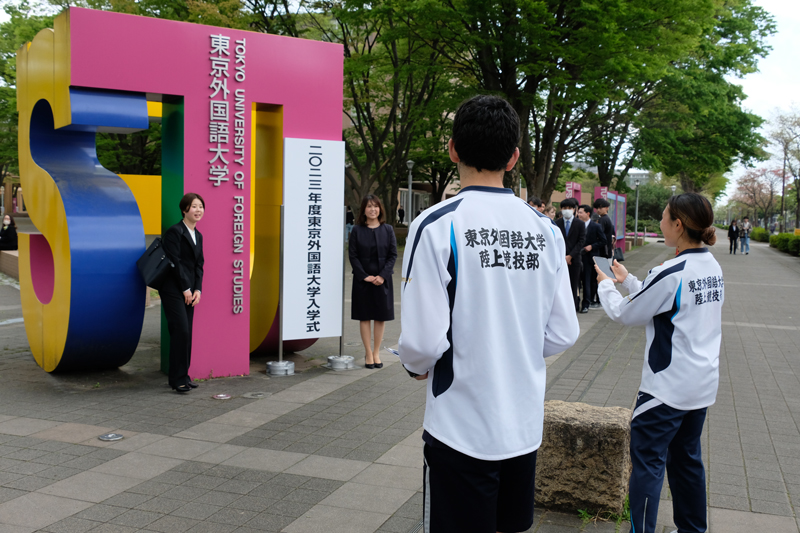
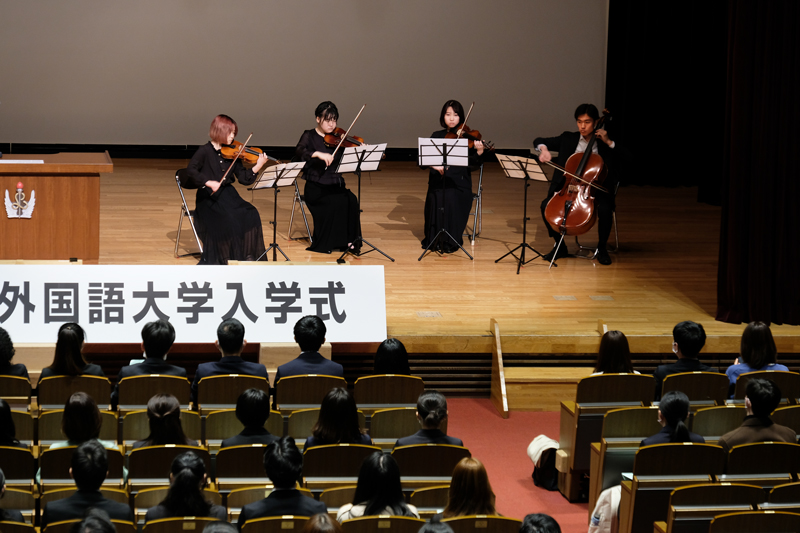
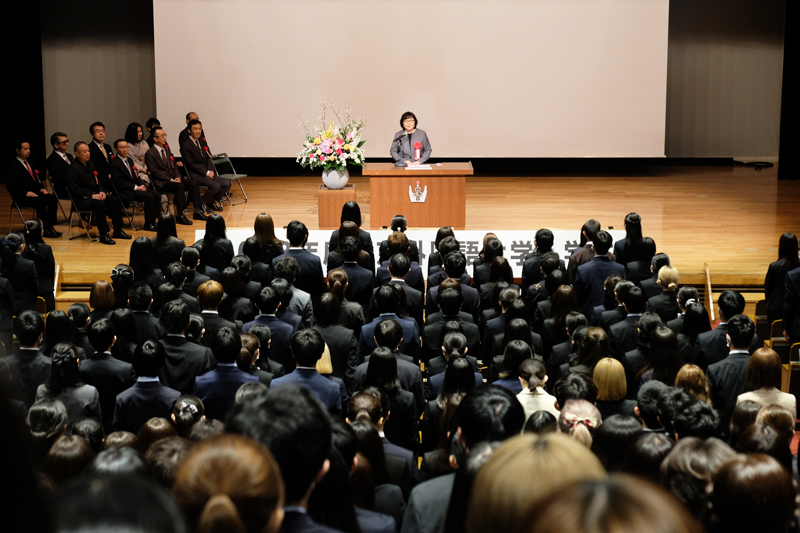
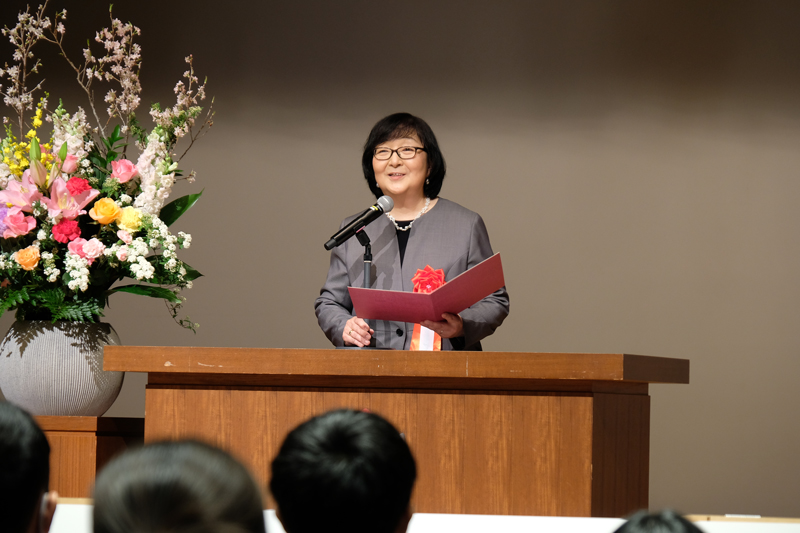
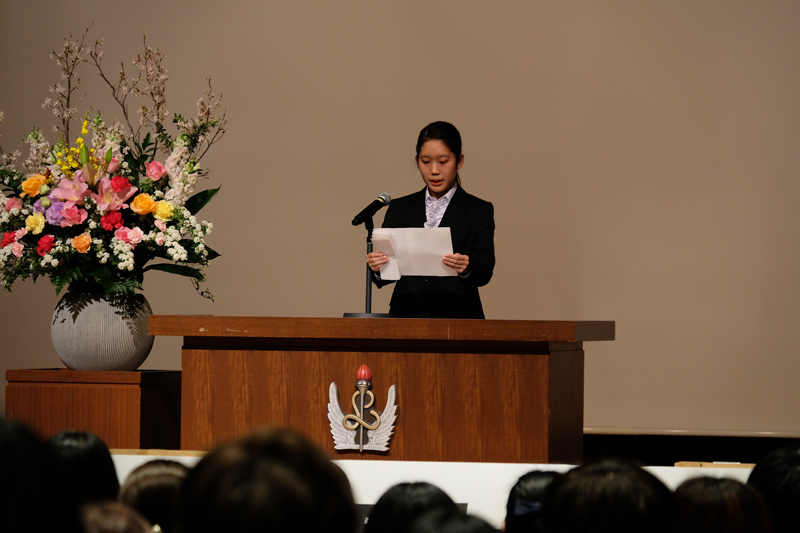
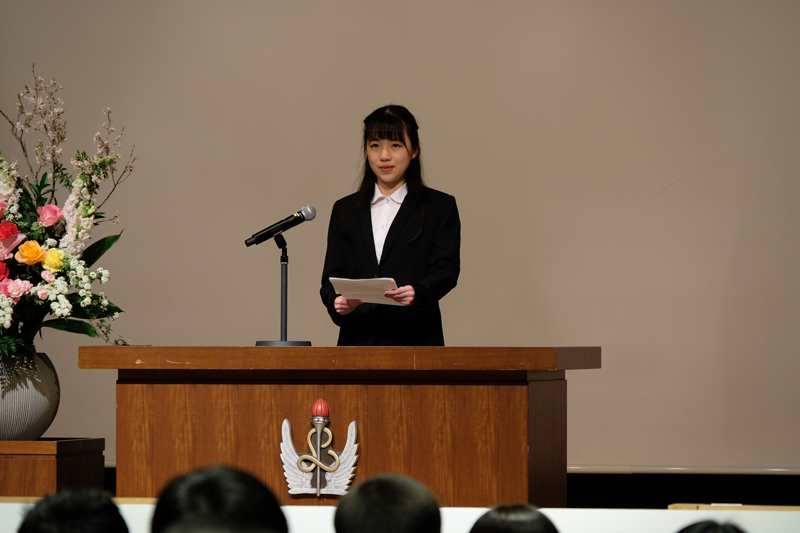
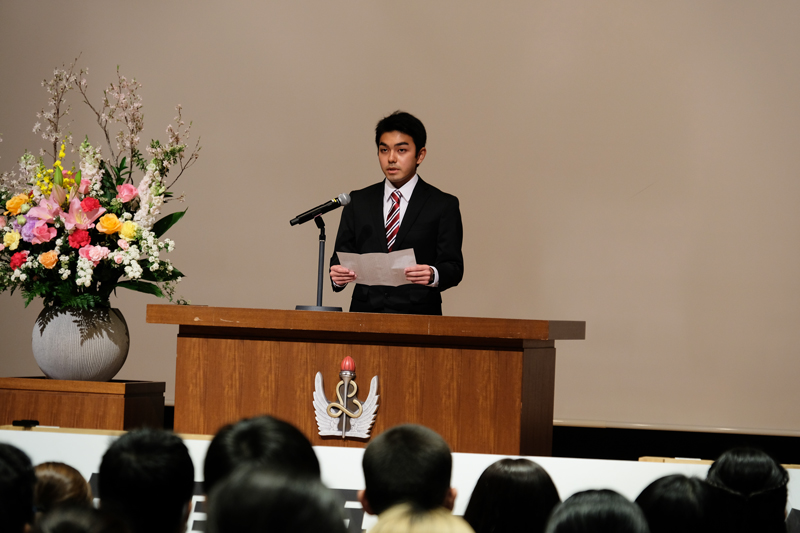
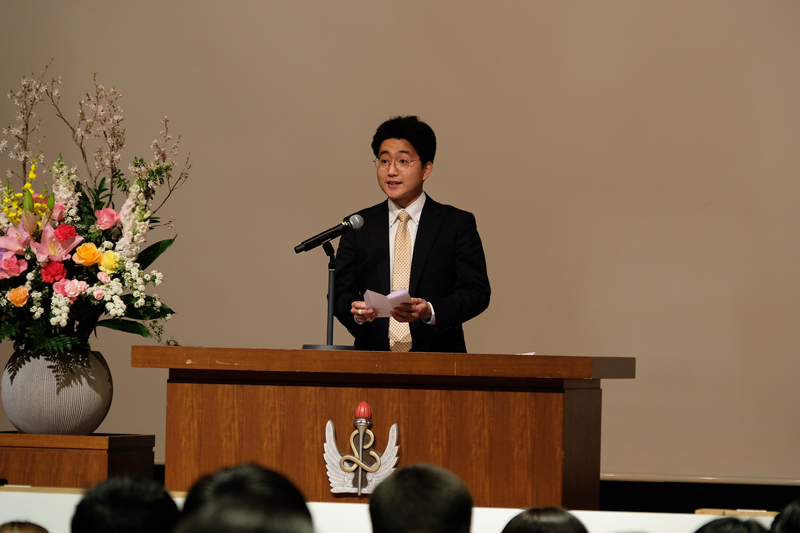
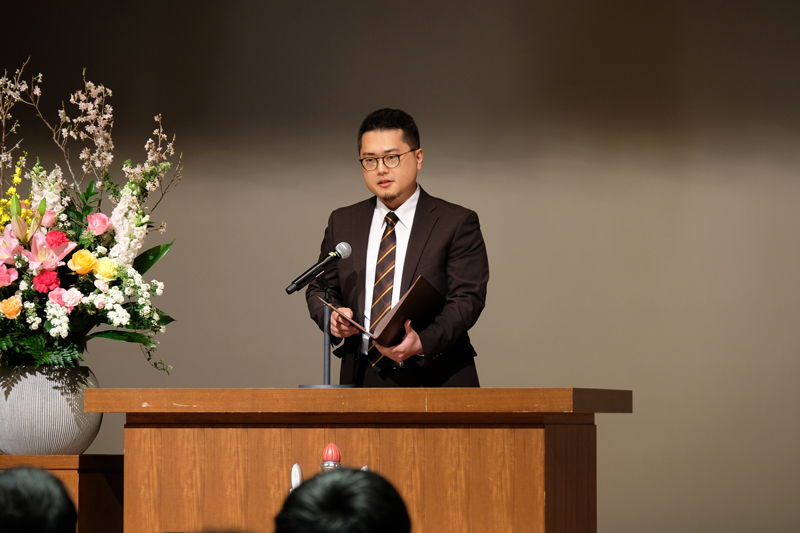
2023 Entry Ceremonial Address from the President (for undergraduate students)

Congratulations on your admission to TUFS! It is a great pleasure to be able to welcome you all here today to our verdant campus. This is the first time in four years that we have gathered in this hall for school-wide entrance ceremonies. Many parents and guardians are attending the ceremony. We hope that you will take the time to see the campus where students will spend the next four years of their lives.
The effect of COVID-19 pandemic has finally faded and ordinary days have returned. However, for students who have lived under the shadow of the pandemic for the last three years, I imagine you’re probably wondering what normal might be. Having spent your high school years under unusual circumstances, I urge you to use your days more proactively than you perhaps “normally” might. “Normal” for a TUFS student generally means spending your first two years busily studying while also engaging in club activities on the sidelines and doing short-term study abroad during the summer and winter. In their third year, they probably join a small-group seminar class, do their long-term study abroad, and engage in job-hunting. Of course, there’s no need for you to fit the mold, but given how much “normal” was lost over the last three years, I sincerely hope that you will enjoy a normal, or even more than normal, meaningful university life.
At the same time, study at TUFS is no walk in the park. Learning a new language requires a bit of patience, and you have to find out for yourself what you will specialize in using the language as a tool. These challenges come in waves. But don’t worry. Your seniors overcame these waves with flying colors.
The reason that we press you so hard is because that’s how much we believe in you. We have no doubt that you have the strength to overcome the challenges and achieve even more than we expected of you.
Looking at our own society and out across the world, I’m sure you’re all keenly aware of the difficult times in which we live.
Today, the world is faced with various conflicts and sparks, not limited to Russia's invasion of Ukraine. It has been a long time since the world has lost its true leaders, and this may be because the values that everyone can agree on have been lost. The scene is so pervasive that everyone is looking in different directions, insisting on what they think is right, and hurling accusations at those who do not agree with them.
The only way to break through this situation will be to acknowledge each other’s values and then each listen to what the other has to say. Understanding our respective core values and working to discover common ground will bring us closer together.
Imagination and empathy are also vital.
The people on the battlefield in the ongoing war in Ukraine and the people behind it, people under the military regime in Myanmar, Afghan girls who cannot go to school. The lives of those living in North Korea or Xinjiang or Tibet which are not shown on television; The earthquake victims in Turkey and Syria. In order to be mindful of these issues, we must understand the backgrounds, feelings, and thoughts of the people who are in each of these situations. The first step in this process is to listen directly to what people have to say.
Here in Japan too, there are many people with connections to foreign countries living in Japan. As you know from your own experience, there is no end to the challenges of living together in harmony.
The advance of artificial intelligence may have made it possible to use automatic translation to understand in our own language what the other person is saying, but we will never close the distance between us in a world where we each speak only our own language and that language is our only vehicle for understanding. What is needed today is to use imagination and empathy to somehow bind together a world that continues to splinter and divide without end. This is the aim of learning at TUFS. You might begin by learning a language, but your destination is to understand the people and cultures of the world and forge connections among them.
My heartfelt hope is that all of you who will study here at TUFS will become a force for resolving the world’s problems. May you go forward with ambition and spend your university days meaningfully.
Again, congratulations and welcome.
-
April 8, 2023
Kayoko Hayashi
President, Tokyo University of Foreign Studies
2023 Entry Ceremonial Address from the President (for postgraduate students)
Congratulations on moving up to graduate school. 103 students have advanced to a master’s program, 34 to a doctoral program. As of today, each of you has become a member of the TUFS Graduate School of Global Studies.
If you are a new master’s student, the theme that you have chosen to explore in your particular discipline within the Graduate School is likely an element of your graduation thesis research that you want to further deepen, or of your master’s thesis research if you are a new doctoral student. Others of you have been drawn to graduate school to pursue an issue that confronted you as a member of society.
A key feature of study at the Graduate School of Global Studies is that while individual students’ research themes appear highly disparate, together they teach us about people, society, and the paths that both have taken to date, while also laying out the future. Your various research themes might seem as scattered as stars across the sky, but together they create a cluster like a solar system and, beyond, a galaxy. I urge you to be conscious of how your particular theme is connected to a wide range of other areas and to society and deepen your research together with your fellow students.
The reason that I emphasize this aspect of research connected to society is because of the myriad issues in society that should be resolved through humanities and social science research. Whether looking at our own society or out across the world, I’m sure you’re all keenly aware of just how many problems we face.
I would like to give two examples. One is a challenge for area studies.
The world is currently riven by infinite large and small fractures. The result has been Russia’s invasion of Ukraine and regional conflicts around the world, while those conflicts are becoming increasingly complex due to the various expectations involved. With universally persuasive values lost and a dearth of true leaders, the world continues to walk in darkness. All we see everywhere is people pulling in their own particular directions and insisting that they are correct while pouring criticism on anything unfavorable to themselves.
Overcoming this situation will require understanding exactly how our position differs from the other party’s core values, while coming to understand others through an understanding of their region and their history will be essential to a resolution. This is exactly what humanities and social sciences research reveals.
The second example is the need to reveal human potential. Scientific research is currently making striking progress. Artificial intelligence is approaching human intelligence, and the impossible is rapidly becoming possible. Faced with such technological advances, we are being forced to question the nature of human imagination and where human potential might lie. Science and technology forge ahead, but people remain unchanged. Closing that gap too is the role of humanities and social science research.
With technological advance, battlefields have become high tech showcases, broadcast live as battles unfold, but the accompanying grief at the loss of human life and anger towards war have remained unchanged since, in the case of Japan, the ancient Manyōshū poetry anthology. The potential of a human society not controlled by technology must be debated in those academic disciplines that deal with people and their unchanging emotions and egos. What is a human being, and what is human happiness? These are the fundamental questions that must be clarified through humanities and social science research.
In short, your research is tied to society, and I hope you will continue your research at graduate school with that outlook and that perspective.
MIRAI (Multi- and Inter-cultural Research and Innovation Fellowship) is a TUFS research and career support program for doctoral program students focused primarily on research that widens research horizons, connects to society, and connects with the sciences. Many of our doctoral students are already part of the program, but MIRAI’s activities are also open to students outside the program. I urge our master’s students too to look into becoming future MIRAI students.
I am convinced that your research will connect to society and become a force for social change. Again, welcome to graduate school, and may your time here be rich and productive.
-
April 8, 2023
Kayoko Hayashi
President, Tokyo University of Foreign Studies
